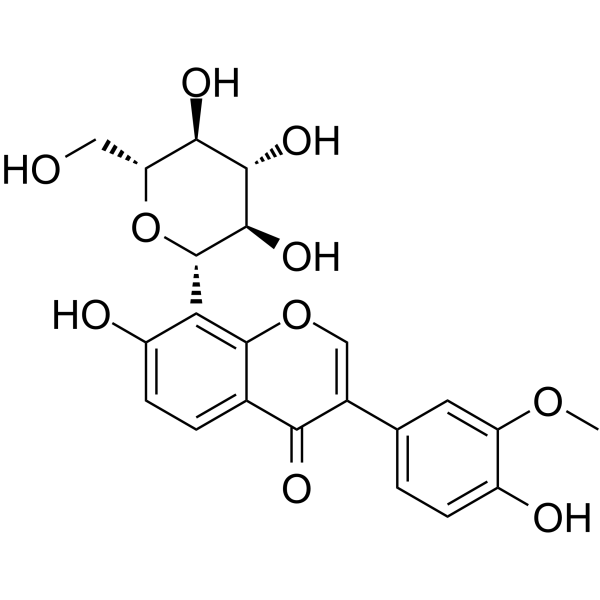天然产物 糖类和糖苷 Saccharides and Glycosides
3′-Methoxypuerarin; 纯度: 99.90%
3′-Methoxypuerarin (3′-MOP)是从葛根中提取的异黄酮,具有神经元保护活性。

3′-Methoxypuerarin Chemical Structure
CAS No. : 117047-07-1
| 规格 | 价格 | 是否有货 | 数量 |
|---|---|---|---|
| 5 mg | ¥1280 | In-stock | |
| 10 mg | ; | 询价 | ; |
| 50 mg | ; | 询价 | ; |
* Please select Quantity before adding items.
3′-Methoxypuerarin 相关产品
bull;相关化合物库:
- Natural Product Library Plus
- Bioactive Compound Library Plus
- Natural Product Library
- Medicine Food Homology Compound Library
- Phenols Library
- Traditional Chinese Medicine Monomer Library
- Flavonoids Library
| 生物活性 |
3′-Methoxypuerarin (3′-MOP) is an isoflavone extracted from radix puerariae that shows neuron protection activity. |
||||||||||||||||
|---|---|---|---|---|---|---|---|---|---|---|---|---|---|---|---|---|---|
| 体内研究 (In Vivo) |
3′-Methoxypuerarin increases the number of surviving neurons in the hippocampal CA1 region and markedly reduces the number of apoptotic pyramidal neurons after ischemia/reperfusion injury. 3′-Methoxypuerarin can protect hippocampal neurons against I/R injury by inhibiting apoptosis[1]. MCE has not independently confirmed the accuracy of these methods. They are for reference only. |
||||||||||||||||
| 分子量 |
446.40 |
||||||||||||||||
| Formula |
C22H22O10 |
||||||||||||||||
| CAS 号 |
117047-07-1 |
||||||||||||||||
| 运输条件 |
Room temperature in continental US; may vary elsewhere. |
||||||||||||||||
| 储存方式 |
4deg;C, sealed storage, away from moisture and light *In solvent : -80deg;C, 6 months; -20deg;C, 1 month (sealed storage, away from moisture and light) |
||||||||||||||||
| 溶解性数据 |
In Vitro:;
DMSO : 250 mg/mL (560.04 mM; Need ultrasonic) 配制储备液
*
请根据产品在不同溶剂中的溶解度选择合适的溶剂配制储备液;一旦配成溶液,请分装保存,避免反复冻融造成的产品失效。 In Vivo:
请根据您的实验动物和给药方式选择适当的溶解方案。以下溶解方案都请先按照 In Vitro 方式配制澄清的储备液,再依次添加助溶剂: ——为保证实验结果的可靠性,澄清的储备液可以根据储存条件,适当保存;体内实验的工作液,建议您现用现配,当天使用; 以下溶剂前显示的百
|
||||||||||||||||
| 参考文献 |
|
| Animal Administration [1] |
Rats[1] Male Wistar rats, weighing 260-320 g are randomly divided into three groups (n = 8 per group). [1] I/R+3′-MOP group: the rats undergo 8 minutes of ischemia and then 3 days of reperfusion. The 3′-Methoxypuerarin (60 mg/kg i.p.) is administrated at the moment of clamping of the carotid arteries. The rats receive daily i.p. injection of 3′-Methoxypuerarin for 3 days. [2] I/R group: the rats undergo 8 minutes of ischemia and 72 h of reperfusion. The same volume of solvent (35% polyethylene glycol solution) is administrated in the same way as 3′-Methoxypuerarin. [3] Control group: the rats undergo a sham operation. Vertebral and carotid arteries are exposed but not occluded. The rats receive a daily i.p. injection of 35% polyethylene glycol solution for 3 days[1]. MCE has not independently confirmed the accuracy of these methods. They are for reference only. |
|---|---|
| 参考文献 |
|
